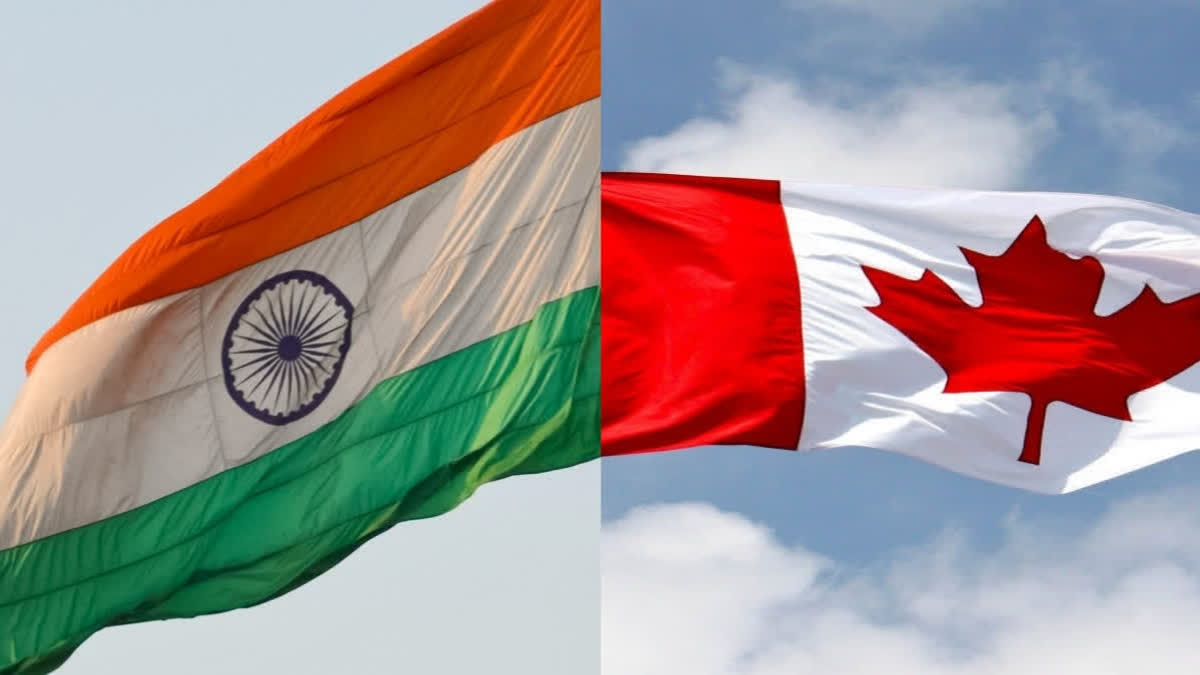New Delhi: In the face of the diplomatic row between India and Canada, Canadian Defence Minister Bill Blair has said that his country will continue to pursue its new Indo-Pacific Strategy with India being an important partner. His comments came even as diplomatic ties between India and Canada plunged to a new low after Canadian Prime Minister Justin Trudeau alleged that New Delhi had a hand in the killing of Khalistani extremist Hardeep Singh Nijjar at Surrey in British Columbia in June this year.
India hit back hard dismissing the allegation as “absurd and motivated” and also expelling a senior Canadian diplomat in a tit-for-tat response after Ottawa expelled a senior Indian diplomat. India then issued a travel advisory to Indians travelling to or living in Canada. New Delhi did not stop at that. It suspended the issuance of visas to all Canadians. New Delhi has also asked Ottawa to downsize its diplomatic staff in India and bring it to parity with the number of its diplomats in Canada.
Nevertheless, Canadian Defence Minister Blair has said that his country’s relationship with India is “important” and will pursue cooperation with New Delhi in Ottawa’s Indo-Pacific Strategy even as the investigations into the killing of Nijjar continue. So, what is Canada’s new Indo-Pacific Strategy? Unveiled in November last year by Canadian Foreign Minister Melanie Joly, the strategy positions Canada as a “reliable partner” to the region that stretches from the east coast of Japan to the east coast of Africa. It is an ambitious plan, beginning with an investment of almost $2.3 billion over the next five years.
The strategy has five interconnected strategic objectives: promoting peace, resilience and security; expanding trade, investment, and supply-chain resilience; investing in and connecting with people; building a sustainable and green future and Canada being an active and engaged partner in the Indo-Pacific.
According to Global Affairs Canada, to advance Canada’s regional peace and security interests, Ottawa will invest over $720.6 million as part of this strategy. These include reinforcing Canada’s Indo-Pacific naval presence, increasing Canadian armed forces’ participation in regional military exercises, and launching a new multi-department initiative to help develop cyber security capacity in select regional partners.
Under the strategy, Canada will invest $244.6 million to foster open, rules-based trade and support for Canada’s economic prosperity. These include establishing a Canadian trade gateway in Southeast Asia, setting up Canada’s first agriculture office in the region to increase and diversify agriculture and agri-food exports to the Indo-Pacific, and expanding natural resource ties with Indo-Pacific partners in trade, investment, and science, technology and innovation.
The strategy also seeks to forge stronger people-to-people ties with the Indo-Pacific with a contribution of $261.7 million. This includes feminist international assistance policy development funding to support the Indo-Pacific, and enhancing Canada’s visa processing capacity within Canada’s centralised network as well as in New Delhi, Chandigarh, Islamabad, and Manila to support stronger peoples-to-people ties.
Under the “building a sustainable and green future” objective of the strategy, Canada has committed $913.3 million. This is aimed at enhancing the capacity of FinDev Canada to expand its operations into the Indo-Pacific and accelerate its work in priority markets in order to support high-quality, sustainable infrastructure and reinforcing a healthy marine environment in the Indo-Pacific region, including enhanced measures against illegal, unreported and unregulated fishing.
Under the strategy, Canada has also committed $147 million to “strengthen its presence, visibility and influence” in the Indo-Pacific. The aim is to significantly expand capacity at Canada’s missions abroad and within Global Affairs Canada and to set up a new office of the Asia-Pacific Foundation of Canada in the region to help build and strengthen relations with local partners.
Now, New Delhi has strategic interests in the Indo-Pacific region given India’s geographical location. India is part of a Quad, which also includes the US, Australia and Japan that is working for a free and open Indo-Pacific in the face of China’s hegemony in the region. Defence Minister Blair suggested that Canada will continue to pursue its partnerships under the Indo-Pacific Strategy while the investigation into allegations continues, calling the relationship with India “important.”
“We understand that this can be, and has proven to be, a challenging issue with respect to our relationship with India,” he was quoted as saying by Global News. “But at the same time, we have a responsibility to defend the law, defend our citizens, and at the same time make sure that we conduct a thorough investigation (into the Nijjar killing) and get to the truth.” Given the sudden deterioration of ties between New Delhi and Ottawa, how far can Canada go ahead with its Indo-Pacific Strategy?
“India is a major factor in the Indo-Pacific, along with the US, Japan and Australia,” K Yhome, Fellow at the Shillong-based Asian Confluence think tank and who follows Indo-Pacific issues keenly, told ETV Bharat. “Apart from this, India is cooperating with the EU (European Union), France, the UK and Germany in the region. All these key players have strong ties with India.”
In this context, Yhome said that if the bilateral relationship between New Delhi and Ottawa is not conducive, it will be difficult for Canada to play an active role in the Indo-Pacific. “Today, all the major Western powers want to be a partner of India to enhance their footprint in the Indo-Pacific region,” he said. “Being a partner of the Western alliance, it will be difficult for Canada to play an isolated role away from the larger Western interests.”
Yhome said that though bilateral ties have ups and downs, this would not directly affect the shared interests of India and its partners. “India also has bilateral challenges with the US like racial attacks on Indians. But, that does not mean that it will change the strategic interests of the two countries in the long run.”
At the same time, Yhome stressed that domestic issues do have a bearing on the foreign policy of a country. “So, as long as the current leadership in Canada continues, it will not be helpful for Canada to play a larger role in the Indo-Pacific,” he stated. “Once the leadership changes, this will not be a core issue that will hamper bilateral ties. Countries like the US will use back channels to send the message to Canada not to take matters too far.” It may be mentioned that Canada heads for parliamentary elections in 2025.


